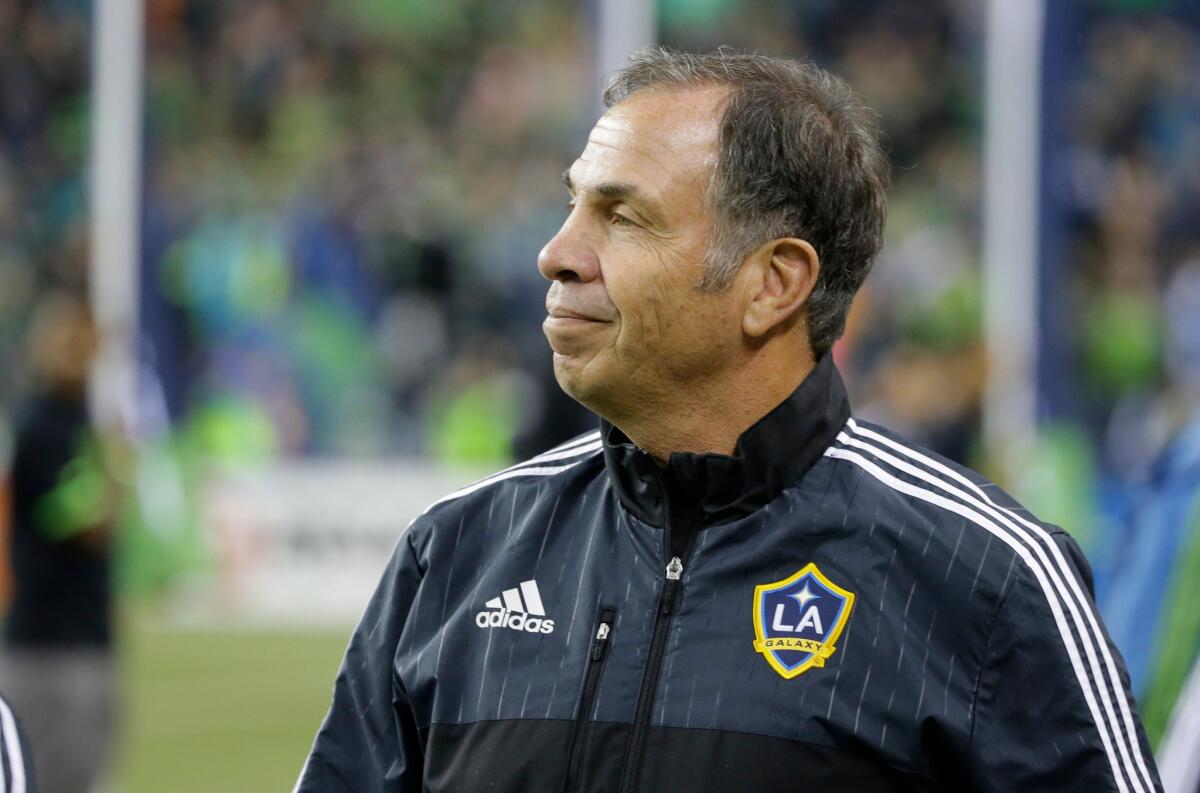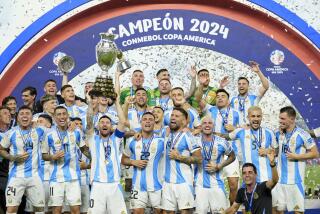Column: Bruce Arena faces a major makeover wherever he goes

- Share via
In the midst of the panic swirling around the U.S. national team and the exodus underway with the Galaxy, the man whose name has wound up in the middle of both situations has chosen to remain quiet.
“I’m quite comfortable being in the background,” Bruce Arena said Friday.
Maybe. But that won’t last forever.
Silence doesn’t suit Arena, who has always been a foreground kind of guy. In a previous stint as coach of the national team, he made it to a World Cup quarterfinal and won a national-record 71 games. With the Galaxy, he made it to the conference semifinals seven times in eight full seasons and won three MLS Cups.
He’s the most successful coach in U.S. soccer history and a Hall of Famer who will be heard from before all this is over. For now, however, the only thing we know for certain is that Arena, 65, will be coaching somewhere next year.
According to a club source with knowledge of the situation, Arena quietly signed a two-year contract extension with the Galaxy this fall. The deal does not include a clause allowing Arena to leave if the national team comes calling, although the Galaxy could choose to let him go.
Yet, contrary to published reports, there have been no formal conversations between the team and the U.S. Soccer Federation regarding Arena.
That last part could change soon. The U.S. is off to a disastrous start in the final round of World Cup qualifying, having gone winless through two games for the first time. In the second one the Americans quit in the second half of an embarrassing 4-0 loss in Costa Rica, a result that turned up the gas on the hot seat under Coach Jurgen Klinsmann.
The U.S. doesn’t play its next qualifier until March, making this the ideal time to change coaches. And Arena, given his resume and his respect in the game, would be the ideal replacement.
But it’s not at all certain that Sunil Gulati, president of the U.S. Soccer Federation, wants to make a change. Gulati is personally invested in Klinsmann’s success, having fought long and hard to land him as coach five years ago. He then rewarded him with a contract extension through 2018, one that reportedly paid him more than $3.2 million in 2014 while expanding his duties by making him U.S. Soccer’s technical director as well.
Buying him out of that contract would cost millions, an expense that may be unnecessary since the U.S., despite the slow start, is likely to qualify for the next World Cup anyway. The six-team, 10-game CONCACAF qualifying tournament is extremely forgiving, with the top three finishers all earning automatic World Cup invitations and the fourth-place team moving on to an intercontinental playoff where another tournament berth will be available. That’s the path Mexico followed to Brazil after winning just one of its first eight qualifiers three years ago.
Then there’s the history against a move: The U.S. hasn’t changed coaches in the middle of a qualifying cycle since 1989.
Gulati needs to make a decision soon. Leaving Klinsmann to twist in the wind weakens his already tenuous grip on the national team. If he’s not going to get a pink slip, then give him an unequivocal and public vote of confidence even though it will be unpopular with much of the fan base.
Any lingering uncertainty affects the Galaxy, too, because if the national squad is a team in turmoil, the Galaxy are one in transition. And the deeper the Galaxy get into their busy off-season, the less likely it becomes that Arena – who is also the team’s general manager – will be made available.
In less than 72 hours last week the Galaxy lost Dave Sarachan, Arena’s longtime assistant and confidant, as well as designated players Robbie Keane and Steven Gerrard.
The team is likely to replace both DPs, but Sarachan, who said he left to explore other opportunities, is irreplaceable.
Going forward, the Galaxy now have to make decisions regarding more than a half-dozen players who are out of contract or have options the club could exercise. In addition, the team has less than a month to prepare for the mid-December trade window, the reentry draft, free-agent negotiations and the waiver draft.
Much of that will demand Arena’s attention.
Internally, the Galaxy rearranged some of their technical and player development responsibilities in the last year as part of a wider reinvestment in scouting and academy programs, insuring the team remains the model MLS franchise. Those moves mirror a leaguewide shift away from the acquisition of expensive foreign talent in favor of a more holistic approach toward roster-building.
That, too, is something the general manager figures to be involved in. And the more he gets into it, the harder it will be for the Galaxy to let Arena out.
Gulati, then, is on the clock. Because while Arena’s country may eventually decide it needs him, if it waits too long, the Galaxy may decide it needs him more.
Twitter: @kbaxter11





